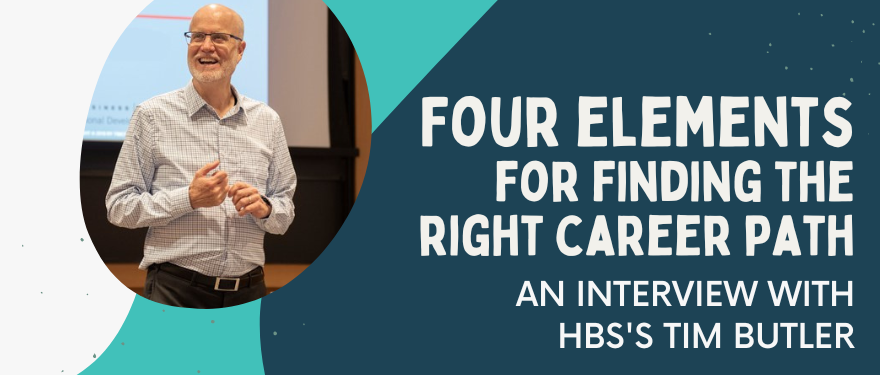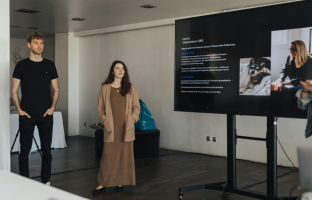When people contemplate a career change, astute thinking alone won’t necessarily take them in the right direction.
Instead, when career changes and other huge life-changing experiences are at stake, people should tap into their “full self” to help them make the decisions that are best for them, argues Timothy Butler, senior fellow and faculty advisor to Career and Professional Development Programs at Harvard Business School. His research focuses on career decision making.
In this interview, Butler discusses his new book, The Four Elements: Finding Right Livelihood in the 21st Century, which outlines four key dimensions that can help people navigate career transitions: Identity, Community, Necessity, and Horizon.
Dina Gerdeman: Can you discuss the research behind your book?
Timothy Butler: Most of my research has been big data-driven, using psychometric assessments to identify the ways in which people find their way to the work roles and work environments that will be most rewarding.
This book was different. It is more of a reflection, looking back over my 40 years of working as a psychologist and a trainer of coaches and counselors. The question I asked was: “What issues are always present when individuals are faced with major career and life decisions?” I arrived at an heuristic that I refer to as the Four Elements model, which looks at four dimensions that are archetypal in that they are always present at these times of decision, whether we are aware of them or not.
Gerdeman: Could you briefly explain each of the Four Elements?
Butler: Sure, the first is Identity. Identity is a lifelong project in which we, and simultaneously the people in our world, have a growing sense of our place in the world in terms of our personal qualities, our deeply embedded life interests, and the skills that we bring to any given situation.
The two root questions for Identity are: “What work roles will allow me to express my deeply embedded life interests?” and “What are the signature skills that I bring to any life situation?”
The second element is Community. The root question for Community is: “What types of people and what organizational cultures will allow me to thrive and make my biggest contribution?”
The third element is Necessity. It is indeed important to understand our passions and find work that fulfills them, but we all live our lives within the gravitational field of necessity. The root question for the Necessity element is: “What are the nonnegotiable obligations and constraints that bear upon my current work and life choices?”
The fourth element is Horizon. The Horizon element is concerned with what we are walking toward in life; there is that in life which pulls us. This is the dimension concerned with our deepest sense of values, meaning, and priority. The root question for the Horizon element is: “How do I understand and move closer to life in its fullest?”
Gerdemen: In your work, how do you help individuals discover how the force of each element is factoring into their life situation?
Butler: At the core of my work with individuals, and my writing on this topic, is my model of implicit and symbolic intelligence. Each of us, at any given moment, has the capacity to experience the whole of our life. Right now, as you sit here, you have what psychologist Eugene Gendlin would call a deep “felt sense" of how everything is interacting together to provide your experience of your total life situation. You cannot use this implicit knowledge, however, because it is preverbal, presymbolic.
What you know deeply, but only implicitly, needs to be transformed into symbolic intelligence. This requires, again and again, finding fresh new language so that you can explain, both to yourself and to others, what is occurring for you within each of the Four Element arenas. This movement from access to implicit knowledge to finding new language for what is implicit is at the core of my work on the coaching process. In the Four Elements book, I lead the reader through this experience for each of the Elements.
Gerdemen: How do you do that in the book?
Butler: Most of us, when faced with a life decision, fall back on our analytical intelligence. We try to use the brute force of thinking to push the situation forward. What is required, however, is an actual new experience about our current reality and both an implicit and symbolic understanding of that new experience. This will never come from employing our conditioned current mental model to problem solve, which is what our analytical intelligence does, even though this approach is highly rewarded in our current world culture.
In the book, I teach the reader the practice of free attention. This is a process not of thinking about oneself, but actually self-observing in real time as our implicit felt senses of our current life situation form. It is similar in some ways to certain meditation practices. I lead the reader into a state of free attention and then, for each of the elements and for a final integration, lead them through an exercise that’s specific for uncovering the current forces at play in each of the Four Element areas.
For the Identity element, we arrive at fresh new language for the day-to-day work activities that are most likely to be fulfilling, as well as new language for our signature skills.
For the Community element, each reader is guided through a process that allows them to create their own personal model of organizational culture which enables them to identify the dimensions of a culture that are most important.
For Necessity, from a place of free attention, each reader is guided through an experience that helps them to identify the most pressing necessities and obligations in their life at the current moment. These obligations may be quite different from what they were even six months before.
The Horizon exercise guides the reader to an understanding of what they already know about life in its fullest, which people represent for them life in its fullest, and what touchstones, such as books, music, poems, memories, places, experiences, objects, and so on, allow them to reconnect with life in its fullest.







